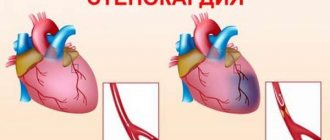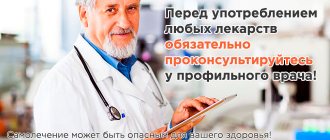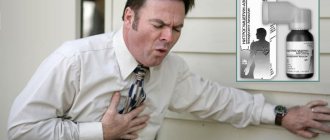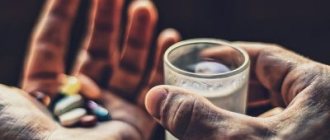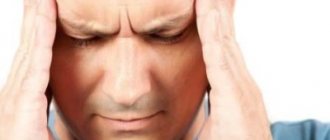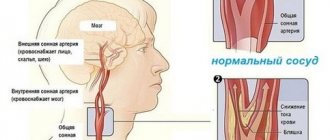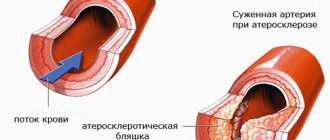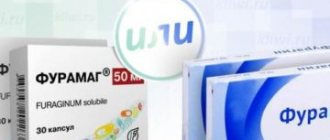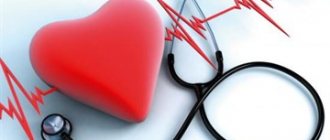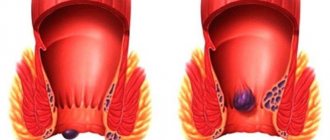The main types of medications that help improve cerebral circulation
Preventive and therapeutic measures should begin to be taken as soon as the first clinical signs indicating problems with cerebral circulation appear. The further development of pathologies very often causes severe consequences, including ischemic and hemorrhagic strokes, as well as dementia, i.e. dementia. Many complications can pose a serious threat not only to the health, but also to the life of the patient.
The main groups of drugs for restoring normal blood circulation in the central nervous system:
- vasodilators (vasodilators);
- anticoagulants and antiplatelet agents (to prevent thrombosis);
- nootropics.
Which drugs are indicated in each specific case can only be determined by a qualified specialist after a detailed history collection and a comprehensive examination of the patient. The doctor determines treatment tactics and identifies optimal single and daily dosages of medications.
Important: self-medication for problems with blood supply to the brain is not only ineffective, but also deadly!
Additional Impact
Problems with blood vessels do not always require immediate use of serious medications. However, the opposite situation is often observed. When taking a course of nootropics or other medications, the patient is sometimes recommended to turn to additional means, such as massage and physical therapy.
Of course, you also need to take care of your lifestyle, give up bad habits and try to understand as much as possible the root cause of the disease. It is very important to spend time walking in the fresh air, even if the patient is only able to move in a wheelchair.
The golden rule of prevention is also relevant for this disease, because It’s better to try to live a healthy lifestyle than to “drive” your own body with an abundance of fat, lack of exercise and bad habits and then treat diseases
Vasodilators for cerebrovascular accidents
Medicines of this clinical and pharmacological group provide an increase in blood flow to the brain tissues, which helps prevent hypoxia at the cellular level.
Normal blood flow also provides the cells of the central nervous system with adequate amounts of vital compounds. Vasodilators improve the functional activity of the brain by stimulating metabolism and energy metabolism in brain cells.
Calcium antagonists used for circulatory disorders in the brain
Pharmacological agents in this category have been successfully used for many years to improve blood circulation in the central nervous system. Currently, work is underway to create third-generation calcium antagonists. The drugs promote relaxation of the muscular vascular walls, due to which the lumen of the arteries expands and the volume of blood flowing to the tissues increases. Calcium antagonists have no effect on the muscular elements of the veins.
These drugs can have a systemic effect on the body, so they should be prescribed with extreme caution, and only after a thorough and comprehensive examination of the patient. Daily and single dosages, as well as the total duration of course therapy are determined only by the attending physician.
Some first generation Sa antagonists:
- dihydropyridines (Cordipine, Nifedipine);
- benzothiazapines (Dilacor);
- phenylalkylamines (Verapamil).
The second generation of drugs used for circulatory disorders in the brain:
- dihydropyridines (Felodipine, Isradipine, Nifedipine GITS, Nasoldipine);
- benzothiazapines (Clentiazem, Diltiazem SR);
- phenylalkylamines (Verapamil SR).
Natural venotonics
The composition of natural venotonics is dominated by natural components that have a tonic and strengthening effect.
The most effective foods and vitamins:
- Blueberry and black currant juice.
- Extract of chokeberry and butcher's broom.
- Grape and dry extract from the leaves of the plant.
- Complex “Siberian health”.
- Vitamins C, P, group B and nicotinamide.
All of the above products can be used as biological additives. They should not be abused, but in moderate doses they can have a positive effect on the circulatory system.
Preparations based on plant extracts
Preparations whose main active ingredients are phytocomponents are characterized by relative safety. As a rule, they have relatively few contraindications. Herbal preparations help prevent disorders of cerebral blood flow, and are widely used for the treatment of already diagnosed pathologies.
Some products in this group are approved for over-the-counter dispensing from pharmacies. They can be used independently, but only after consulting with a therapist and carefully reading the annotation.
Please note: the biologically active ingredients of the most common herbal remedies for normalizing cerebral blood supply are alkaloids from the plants Ginkgo Biloba and Periwinkle.
Remedies from the alkaloid Vinca
The biologically active component of these herbal remedies is characterized by an antispasmodic effect. The plant alkaloid helps normalize cellular metabolism and prevents the formation of blood clots in the vessels of the central nervous system.
The most common drugs in this category used for cerebrovascular disorders include:
- Cavinton;
- Vinpocetine;
- Bravinton.
Important: taking Cavinton and Vinpocetine is allowed only on the recommendation of a doctor, since only a competent specialist can determine the most appropriate route of administration and duration of course therapy in a particular case. A preliminary examination of the patient is required.
Medicines for cerebrovascular disorders from Ginkgo Biloba
The alkaloid of this plant has a complex effect. Healing preparations based on Ginkgo Biloba are characterized by a pronounced antispasmodic effect. They are able to reduce tissue swelling, as well as increase the permeability of the walls of blood vessels and at the same time increase their elasticity. These products help normalize microcirculation. They are also powerful antioxidants, protecting the brain from the negative effects of free radicals at the cellular level.
The most effective herbal remedies from Ginkgo Biloba include:
- Ginkgo Biloba S;
- Tanakan;
- Doppelgerz Ginkgo Biloba Plus.
The duration of the therapeutic course for cerebrovascular accidents, as a rule, is 3 months or more, since the therapeutic effect develops gradually. Positive changes are observed 1 month after the start of treatment.
During the period of treatment with products based on the mentioned plants, you should not simultaneously consume drugs that “thin” the blood (including acetylsalicylic acid), since there is a possibility of hemorrhage.
Venotonics for varicose veins of the legs: for varicocele
Varicocele is an enlargement of the veins of the spermatic cord and testicles. The left-sided form is most widespread, however, it can also occur on the right side, as well as on both testicles.
The causes of the disease are:
- genetic predisposition;
- anatomical features of the male body structure;
- problems with the spine in the lumbar region;
- increased weight, obesity;
- lack of sexual intercourse, masturbation.
Modern medicine provides a large number of drugs that prevent the occurrence of this disease. In advanced forms, surgical intervention is required. To avoid the development of the disease, it is necessary to undergo regular examinations and take preventive measures.
The lower part of the body suffers the most. The legs receive the most stress, which is why varicose veins in the legs plague so many people.
List of drugs used for varicose veins and helping with varicocele (among them there are polyvalent venotonics with a lymphotropic effect):
- Antiox : dietary supplement, helps fight circulatory problems. Active ingredients: grape marc extract, ginkgo biloba, vitamins C, E, beta-carotene, selenium, zinc oxide. Manufacturer: Nutripharma, Ireland Price: from 450 rubles.
- Antiox Plus : dietary supplement, provides essential microelements to improve blood circulation. Active ingredients: grape marc extract, ginkgo biloba, vitamins C, E, beta-carotene, selenium, zinc oxide. Manufacturer: Vision, Europe Price: from 500 rubles.
- Arbiflex : antiplatelet agent. Active ingredients: pentoxifylline. Manufacturer: Russia, Europe Price: from 250 rubles
- Pentoxifylline : active substance available without brand name. Cheap analogue of Arbiflex and others. Active ingredients: pentoxifylline. Manufacturer: Russia Price: from 100 rubles.
- Butcher's broom : a natural remedy that has a venotonic effect. Dv: dry extract of butcher's broom. Manufacturer: Russia Price: from 50 rubles.
- Lyoton 1000: anticoagulant. Aimed at combating venous insufficiency. Active ingredients: sodium heparin. Manufacturer: Berlin-Chemie, Germany Price: from 290 rubles.
- Trombless: anticoagulant. Analogue Lyoton 1000. Dv: sodium heparin. Manufacturer: Nizhpharm, Russia Price: from 200 rubles.
- Viatromb : anticoagulant. Available in the form of a spray for external use. Active ingredients: sodium heparin. Manufacturer: Fabril Pharma, Germany Price: from 300 rubles.
- Heparin: anticoagulant. Cheap analogue of Lyoton 1000, Trombless and Viatromb. DV: sodium heparin. Manufacturer: Russia. Price: from 200 rubles.
- Phlebopha: microcirculation corrector, angioprotector (venoprotector). Active ingredients: diosmin. Manufacturer: Atoll, Russia. Price: from 773 rubles.
- Venolife : anticoagulant. Combined drug. Active ingredients: sodium heparin, dexpanthenol, troxerutin. Manufacturer: Akrikhin OJSC, Russia. Price: from 260 rubles.
- Venotonic Faberlic : foot cream. Active ingredients: horse chestnut and Asian centella extract, farnesol. Manufacturer: Faberlic, expert pharma series, Russia. Price: from 150 rubles.
- Shungite : natural preparation, venotonic balm. Active ingredients: shungite mineral. Manufacturer: Russia. Price: from 150 rubles.
- Horsepower : foot gel. Active ingredients: horse chestnut, medicinal leech extract, camphor. Manufacturer: Horse Force, Russia. Price: from 500 rubles.
- Venotroxin : foot gel. DV: troxerutin. Manufacturer: Russia. Price: from 102 rubles.
- Venoton : ointment for feet. Active ingredients: escin, complex of plant extracts. Manufacturer: Russia. Price: from 150 rubles.
- Diosmin : ointment. Active ingredients: diosmin. Manufacturer: Kanonpharma, Russia. Price: from 450 rubles.
- Hesperidin : flavonoid. Ointment for feet, also helps with hemorrhoids. Active ingredients: citrus extract. Manufacturer: Russia. Price: from 740 rubles.
- Venosmin : tablets, complex composition. Active ingredients: diosmin, hesperidin. Manufacturer: Fitofarm. Price: from 150 rubles.
- Venitan: available in the form of cream and ointment for feet. Active ingredients: sodium heparin, escin. Manufacturer: Sandoz, Switzerland. Price: from 250 rubles.
Self-medication at home is strongly not recommended. If you notice signs of varicocele, you should immediately consult a doctor to establish a diagnosis and choose treatment methods.
Medicines that strengthen vascular walls
A number of drugs and dietary supplements serve to restore the elasticity of vascular walls.
Preparations in this category contain vitamins and macro- and microelements that have a complex effect.
The most effective vitamin P-based drugs used for cerebrovascular disorders are:
- Blueberry Forte;
- Ascorutin.
Potassium, silicon, selenium and other compounds are present in the required quantities in the following dietary supplements and vitamin-mineral complexes:
- Microhydrin;
- Greenwit;
- Nootropic.
Dihydroquercetin, which improves the condition of vascular walls, is contained in such drugs as:
- Dihydroquercetin Plus;
- Flucol;
- Flavit.
Please note: complexes containing vitamins and microelements, as well as dietary supplements that have a preventive effect, can be taken without the recommendation of a therapist, but only after carefully reading the instructions.
Antiplatelet agents and anticoagulants
Antiplatelet drugs are prescribed to improve the rheological properties of blood, i.e., reducing its viscosity. These drugs are indicated if there is a risk of transient cerebral circulation disorders (in common parlance - micro-strokes) or if the patient has an increased tendency to thrombus formation. The drugs make it possible to prevent the development of such a formidable complication as vascular thromboembolism.
To improve blood flow, the following antiplatelet agents may be recommended:
Acetylsalicylic acid;
- Akuprin;
- Aspilate;
- Chime;
- Ticlopidine;
- ThromboASS.
Important: antiplatelet agents are prescribed by the attending physician for cerebrovascular accidents after studying laboratory data and blood tests of the patient.
Anticoagulants serve to reduce blood clotting and restore microcirculation in small vessels.
If indicated, the patient may be prescribed the following anticoagulants:
- Heparin;
- Warfarin;
- Fragmin;
- Clexane.
To avoid dangerous complications (bleeding), during a course of using drugs in this category, patients with cerebral circulatory disorders should periodically donate blood for biochemistry, and the doctor should examine the coagulogram of such patients.
Important: if complications such as vomiting with blood or black feces develop, which are highly likely to indicate the presence of bleeding in the upper gastrointestinal tract, as well as if hematomas (bruises) of various locations appear, you should immediately seek medical help.
Can people with high blood pressure (hypertension) be recruited into the army?
At the age of seventeen, young men are registered with the military registration and enlistment office. And often they and their parents have a question: are they recruited into the army with hypertension? The first medical commission is carried out at pre-conscription age. After this, everyone is assigned a fitness category, and the army’s future depends on this. During conscription, a medical examination is also carried out. Experts give an opinion: are there any deviations from the norm in the conscript’s health that may make it difficult to perform military service. One of these deviations is hypertension.
Diagnostics
The diagnosis of stage 1 hypertension is made when there is persistent high blood pressure. When measuring blood pressure, diastolic (lower reading) and systolic pressure (upper reading) are recorded. Normal blood pressure is 120/80 and no higher.
For accurate diagnosis, three blood pressure measurements are required after a certain time. To diagnose the secondary form of hypertension, you need to undergo an additional examination including a general blood and urine test, specific blood and urine tests, an ECG, etc.
The diagnosis is confirmed in a hospital setting. The results of previous tests obtained during clinical observation, which is carried out over a period of 6 months, are taken into account. If by the time of conscription there are no documents indicating that the conscript has undergone a hospital examination, then the military medical commission will issue a referral for a medical examination.
Suitability categories
Currently, there are 2 ways to legally avoid joining the army:
- enroll in a higher education institution or continue their studies in graduate school;
- be declared unfit for health reasons, in this case everything will depend on what category of fitness is assigned to the conscript.
According to the degree of suitability for military service, they are divided into categories:
- “A” - the young man is considered healthy, that is, there will be no restrictions on the type of military service for him. The number after the “A” may indicate a slight deviation from ideal health.
- “B” - there are restrictions on which troops you will serve in. The number that is placed after the letter “B” deciphers where a soldier can serve, for example, with “B1” airborne units and marines, special forces units are allowed.
- “B” is the most suitable category for those who do not want to join the army. It makes it possible not to serve in peacetime conditions. The citizen will receive a military ID and will be in the reserve, considered partially fit.
- “G” - the conscript is declared unfit for a time, he is given a deferment from service, depending on the disease, from 6 months to a year. Then he is once again required to undergo a medical examination, as he falls under the next draft. He may be assigned a new category; in some cases, a deferment due to illness may be given until the end of conscription age - up to 27 years. A person may not be taken into the army at all.
- “D” - the young man is not drafted into the army for health reasons, and is completely exempt from military duty.
With categories “B” and “D”, you should not dream of getting a job in the Ministry of Internal Affairs, FSB, Ministry of Emergency Situations, etc. in the future.
Nootropic drugs
Drugs belonging to this clinical and pharmacological group improve metabolism in brain cells, increase their resistance to hypoxia and improve memory and cognitive functions. Nootropics help improve mental performance, prevent fatigue and the onset of depression. They are powerful antioxidants and adaptogens. A number of drugs in this category are produced from animal tissue; they contain natural amino acids.
The most effective nootropic drugs prescribed for cerebrovascular disorders are:
Piracetam;
- Actovegin;
- Phenibut;
- Pantogam;
- Glycine;
- Phenotropil;
- Hopantenic acid;
- Cerebrolysin.
Nootropics are indicated for the treatment of dementia (dementia) of vascular origin, ischemic strokes, vegetative-vascular dystonia, memory impairment, deterioration of the ability to concentrate, alcoholic encephalopathy and many other diseases and pathological conditions caused by circulatory disorders in the brain.
Medicines based on nicotinic acid
To improve cerebral circulation, taking vitamin PP (nicotinic acid) preparations is often recommended. This biologically active compound does not have a significant effect on large blood vessels, but promotes the expansion of capillaries.
Vitamin PP allows you to lower the level of so-called. "bad cholesterol", i.e. cholesterol carried by low-density lipoproteins, and reduce the fragility of the walls of blood vessels.
The most common drugs based on nicotinic acid for cerebrovascular disorders:
- A nicotinic acid;
- Acipimox;
- Nikoshpan.
Important: self-medication is strictly prohibited. Injections of the solution (carried out in courses) are carried out under the supervision of the attending physician. As acute symptoms of cerebral blood supply insufficiency are relieved, vitamin PP can be prescribed to the patient in the form of tablets for oral administration for long-term maintenance therapy.
Lotin Alexander, medical columnist
31, total, today
( 193 votes, average: 4.54 out of 5)
Chondroprotectors for joints
Sedalgin: instructions for use, analogues
Related Posts
Side effects
The frequency of side effects was correlated with WHO data. Today there are reactions from almost all vital systems of the human body:
- from the heart and blood vessels: arrhythmia, tachycardia, pasty feet, flushing of the face, drop in blood pressure, shortness of breath, presyncope, vasculitis, orthostatics, cardialgia, ischemia up to AMI;
- from the muscles and musculoskeletal system: arthralgia, cramps, myalgia, back pain, arthrosis, myasthenia gravis;
- from the nervous system: cephalgia, vertigo, presyncope, chronic fatigue, fatigue, malaise, drowsiness, paresthesia, tremor, insomnia, mood swings, anxiety, depression, tinnitus, migraine, ataxia, amnesia;
- from the digestive system: abdominal pain, dyspepsia, nausea, flatulence, constipation, dry mucous membranes, thirst, gum hyperplasia, gastritis, pancreatitis, jaundice;
- from the blood system: thrombocytopenia, leukopenia, thrombocytopenic purpura;
- from the respiratory system - dyspnea, rhinitis, rhinorrhea, nosebleeds, cough;
- from the visual system: diplopia, impaired accommodation, conjunctivitis, loss of visual acuity;
- from the genitourinary system: dysuria, frequent and painful urination, nocturia, polyuria, gynecomastia, impaired potency;
- on the skin: dermatitis, skin itching, urticaria, erythema multiforme, angioedema, alopecia, xeroderma, hyperhidrosis, hyperpigmentation;
- Metabolism: weight fluctuations, hyperglycemia.
Rarely – chills, flying pains, parosmia (perverted sense of smell).

